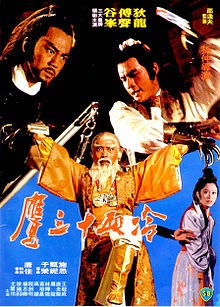 We are still in the final stages of developing Wandering Heroes of Ogre Gate. Our play tests are going well and we are making some tweaks to a few key areas of the game. Things seem to be going as planned and we are hoping for a release sometime in the near future (we don't want to issue an official release date because we'd like to take our time getting things right). Soon I should have a post up about some of the changes we've made to things like Balance Points and other mechanics, but right now I'd like to talk about the role of the supernatural in the setting, particularly in light of how we've used it in recent playtest sessions.
We are still in the final stages of developing Wandering Heroes of Ogre Gate. Our play tests are going well and we are making some tweaks to a few key areas of the game. Things seem to be going as planned and we are hoping for a release sometime in the near future (we don't want to issue an official release date because we'd like to take our time getting things right). Soon I should have a post up about some of the changes we've made to things like Balance Points and other mechanics, but right now I'd like to talk about the role of the supernatural in the setting, particularly in light of how we've used it in recent playtest sessions. One thing to keep in mind is while there are a number of wuxia style films featuring things like Fox Demons and other elements of Chinese mythology, these are not strictly speaking, wuxia. Rather my understanding is they are a genre known as Xian Xia (which might be translated as immortal heroes). Wuxia has some supernatural features of its own but they are very specific. The reason I bring up this distinction is because people looking to run a wuxia-inspired campaign will often come from one of two camps: those deicing a more grounded, strict wuxia setting, and those who want more supernatural.
 You should be able to do either in Wandering Heroes of Ogre Gate. We tried to incorporate a lot of fantasy into the game because that gives the GM more options for adventure. So there are things like Fox Demons and immortals, for example. These are there because they serve as easy springboards to adventure. But the focus, the purpose of the setting, is wuxia, so we try to keep the supernatural stuff peripheral, things you can draw in as needed if your running Wandering Heroes of Ogre Gate or ignore.
You should be able to do either in Wandering Heroes of Ogre Gate. We tried to incorporate a lot of fantasy into the game because that gives the GM more options for adventure. So there are things like Fox Demons and immortals, for example. These are there because they serve as easy springboards to adventure. But the focus, the purpose of the setting, is wuxia, so we try to keep the supernatural stuff peripheral, things you can draw in as needed if your running Wandering Heroes of Ogre Gate or ignore. In my own Wandering Heroes of Ogre Gate campaign, I tend to alternate. I usually do a few character focused sessions that are straight wuxia. These are typically adventures that deal with conflicts between sects, quests for manuals containing powerful Kung Fu Techniques, etc. But I mix this up with an occasional Fox Demon or ghost adventure. For me, this works because overall it has the feel of Return of Condor Heroes but I have the flexibility I need to keep things interesting for the players when they need a change of pace. It also means, if I want to do dungeon crawls, I don't have to limit myself to traps, riddles and human foes; I can throw in monsters as well.
I think this makes for a richer campaign overall. To use some examples this means you can run something like Come Drink With Me or The One-Armed Swordsman but also pull off Painted Skin or Zu Warriors from the Magic Mountain. In the end, I think it is about having options as a GM.
If you follow our most recent playtest reports (HERE) you can see this has led to some interesting places. The party is largely concerned itself with sect conflict and finding something called the Phoenix Crown of Bao. But they also encountered talking monkeys, immortals and are presently chasing after a fox demon. For us this is working out very well, and for me personally I find I am able to draw on the kinds of sources that interest me.
In the next couple of days I should have some updates on the system itself.



















